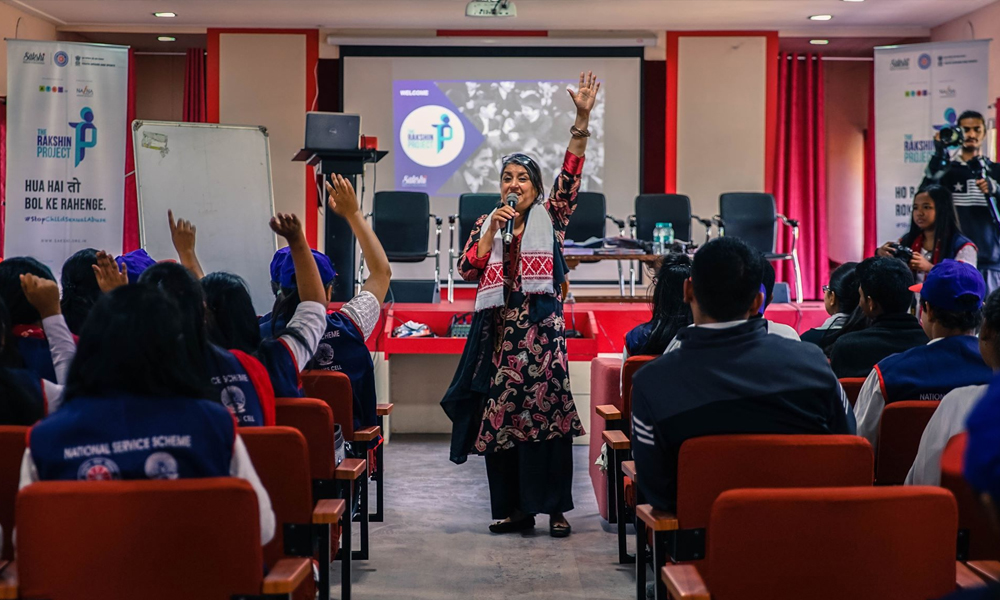
Smita Bharti, ED, Sakshi NGO at a workshop before the lockdown
90% Of Abusers Are Known To Victim: How This NGO Is Prepping Families To Fight Child Sexual Abuse
30 April 2020 10:37 AM GMT | Updated 30 April 2020 2:00 PM GMT
Editor : Shubhendu Deshmukh |
Shubhendu, the quint essential news junky, the man who loves science and politics in equal measure and offers the complete contrast to it by being a fan of urdu poetry as well.
Creatives : Nandan M
Creative designer Skilled in Photography, Graphics, Typography, Animation, and Editing. Strong arts and design professional with a diploma focused on adobe suit.
"It is very difficult to find out about child sexual abuse or offer any kind of support, because 90% of the cases happen with trusted people inside the family," Smita Bharti, the Executive Director/President of Sakshi, a rights-based NGO, tells The Logical Indian.
In the wake of the coronavirus pandemic, India is under a stringent nationwide lockdown till May 3. As people across the country are fighting the novel virus and keeping themselves safe by staying indoors, the lockdown has proven to be nothing short of hell for the children trapped with their abusers at home.
In India, every second child has experienced sexual abuse before the age of 18, most often by family members or people known to them. This has only gotten worse amid the pandemic induced lockdown.
In the first 11 days of the lockdown alone, CHILDLINE for children in distress, which is backed by the Ministry for Women and Child Development, received 3.07 lakh calls of which 92,105 calls were about regarding the abuse and violence on children. CHILDLINE also saw a 50 per cent increase in the number of calls during this period.
Amid the alarming increase in child abuse, Sakshi, a rights-based NGO has launched a #MakeHomeASafeSpace campaign which aims at spreading awareness regarding the importance of an accountable adult community, which is alert, informed and vigilant to secure their homes against potential abuse of children.
#MakeHomeASafeSpace is a part of #StopChildSexualAbuse initiative by The Rakshin Project of Sakshi, in partnership with the Directorate of NSS, Ministry of Youth Affairs and Sports. The Rakshin Project is a pan-India youth-led movement that aims to address the denial, silence, stigma, and shame associated with gender violence with a focus on preventing child sexual abuse(CSA).
"It is very difficult to find out about child sexual abuse or offer any kind of support, because 90 per cent of the cases happen with known people, with trusted people inside the family. And an external agency cannot penetrate a family unit in India," Smita Bharti, the Executive Director/President of Sakshi, tells The Logical Indian.
Talking about the lockdown she says, "Unfortunately, being in a confined lockdown space is a hotbed for a spike in violence and abuse. If 50 per cent of people are undergoing child sexual abuse, then 50 per cent of homes are not safe for 50 per cent of our children in a lockdown situation."
"It becomes very critical that there is somebody within the household who is equipped to deescalate the situation, who is equipped to separate the abuser from the abusive, and be able to create a safe and secure space for the child, talk to the child, address what the child is experiencing, and also keep the child safe," she adds.
Through its Rakshin Project, while Sakshi has been educating the youth to prevent child sexual abuse, the current lockdown scenario required the NGO to adapt its offline education programme to an online model. Currently, they have begun to reach out to its students' constituency through webinars across the country. In 22 days alone, they have reached out to 2,200 children and the numbers are growing by the day.
For the past 27 years, the NGO has been working against Sexual Harassment and Child Sexual Abuse in India. Naina Kapur, Co-Founder, and former Director of Sakshi has been the force behind The Vishaka Guidelines 1997 which led to the formation of POSH (2013) and has fought extensively to bring about reforms in the law and child-friendly measures in courts.
It was also the efforts of the NGO that led to the development of sexual harassment law, drafting of a reformative sexual assault law, design of special procedures for women and children in sexual violence cases, and creative resource development among many others.
The Rakshin Project
Through its various efforts in fighting child abuse, Sakshi realised that it was important to educate the youth in the country to make them understand the laws, what their rights are, and how they can become champions of change and work towards prevention of child sexual abuse.
They then partnered with the Ministry of Youth Affairs and Sports to launch the Rakshin Project. The Ministry further directed the NGO to deliver workshops for NSS(National Service Scheme) units in 41,000 colleges across India.
"Usually, CSA is ignored and we don't address it. Often, there's denial about it - that it can't be happening in my house, it can't be happening around me, it can't be happening with friends and family. Even if we get to know about it, it's something so taboo - let's not talk about it, let's just keep quiet about it, let's not bring it to anybody's attention - because then we'll all feel very ashamed and we'll be stigmatised. So denial and stigma is very strong around it," explains Bharti.
At Gandhigram College, Maharashtra, before the lockdown
At its core, the Rakshin project aims to keep one member in a family informed and educated about how to prevent CSA.
"The idea of reaching out to youth between 18 to 22 years is really simple. Each student we are reaching and educating to be a preventer has a family. Each of these students is tasked with a simple action. Each will teach two - one older and one younger family member. If families acquire a comfort around the language to prevent child sexual abuse and can have a conversation on what to watch out for, and how to call out the behaviour, without succumbing to the barriers of denial, silence, shame and stigma, half the battle is won, and in turn, we have a young generation taking charge of creating a constitutionally enabled secure home space, free of child sexual abuse," explains Bharti.
With the alarming number of CSA reported in the country, the programme was carefully designed to keep in mind that one in two of the students addressed could be survivors or may have witnessed some form of abuse, which can be a traumatic experience for the children.
At Priyadarshini Girls College, Maharashtra, before the lockdown
The workshops for the youth include awareness sessions on rights and responsibilities for gender equality and orientations and capacity building for compliance of POCSOA 2012, (Amendment 2019). The students go through five levels of rakshin mentorship which engage them continuously.
"One of the first things that we put into place was resolution mechanisms. If students gather the courage to talk about it, then disclosure cannot be the ending point. Disclosure has to be the beginning point for it. Because what after the disclosure? What can they do once they have recognised and accepted that they or somebody they know has been through this experience? So we put together a resolution mechanism which has counselling options, legal advice, and we created it as a free of cost service," says Bharti.
 All section
All section














